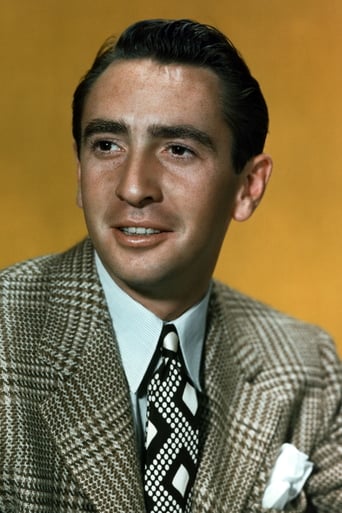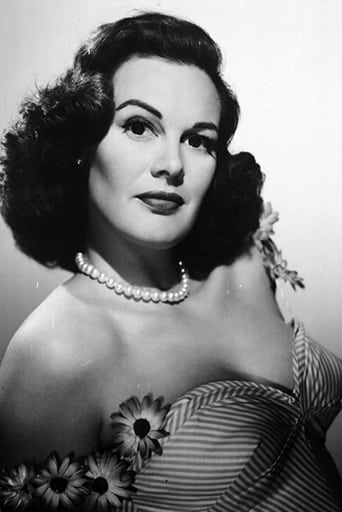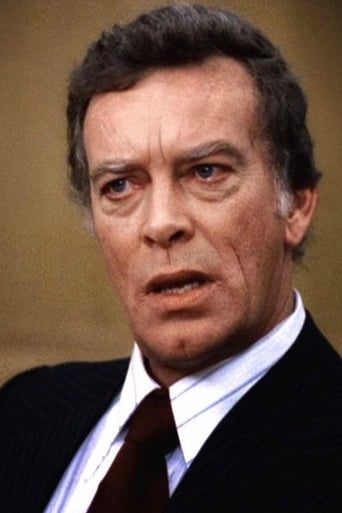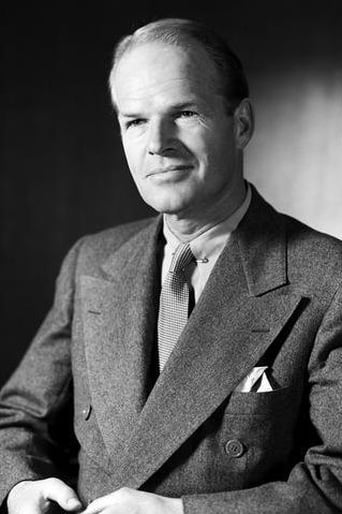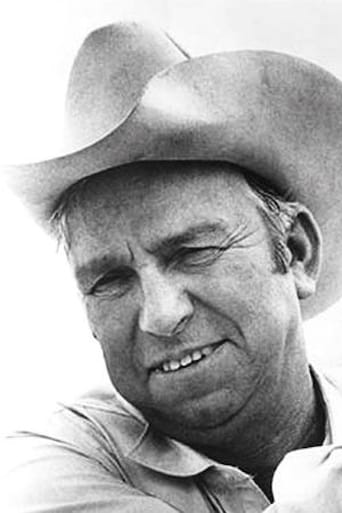Ensofter
Overrated and overhyped
FeistyUpper
If you don't like this, we can't be friends.
TaryBiggBall
It was OK. I don't see why everyone loves it so much. It wasn't very smart or deep or well-directed.
Kaelan Mccaffrey
Like the great film, it's made with a great deal of visible affection both in front of and behind the camera.
tealeye
William Whitney's psychological western 'Stranger at my Door' is a stroke of genius in every aspect. The cast includes some of the most underrated actors of that time: Skip Homeier proves his extraordinary acting skill in this, probably the most complex part of his career. Originally introduced as the young bank robber Clay Anderson (who hides on the farm of preacher Hollis Jarret (Macdonald Carey) and uses the preacher's family to put pressure on him), the character develops a very gentle side within the few days on the Jarret farm, especially towards the preacher's young son, Dodie (Stephen Wootten). Finally, Homeier gets to play a leading lady's love interest, an aspect he did not get the chance to show very often, because he was typecast as the villain at a very early age. What a shame, really; Always vacillating between rough passion and real love, he develops such an intensity and charisma in his performance that the viewer can fully understand that the preacher's neglected wife Peg (Patricia Medina) falls for this mysterious young man. The increasing sexual tension between these two characters is merely shown through glances, brilliant facial expressions, and subtle erotic presence, and it is never resolved.There is not a single kiss between Medina and Homeier, although the audience keeps waiting for it. Another interesting aspect is that Clay Anderson does not entirely make use of his power over Peg but merely makes her aware of her unsatisfactory life and waits for her to make the first move. Despite the age difference, the chemistry between these two character actors is terrific. Patricia Medina makes Peg's inner turmoil very believable. Peg remains in conflict between her passion for Clay and the safety in the passionless union with Hollis until the bitter end. There are some parallels to 'Duel in the Sun' here, but 'Stranger at my Door'is a lot more subtle, and therefore much more fascinating. Medina's strongest moment is when she hears a knock at the door and, thinking Clay is in front of it, slams the door shut and locks it, only to realize shortly after that it's just the sheriff. Her character is also the only character with a kind of musical leitmotif… Hitchcock actor Macdonald Carey is the perfect counterpart in this triangle. The only problem is that Carey is almost too attractive to make it believable that Medina is unhappy in her marriage with 'the older man.' Still Whitney's direction succeeds in taking away some of Carey's attractiveness with his directing: During their honeymoon, Jarret sits on a chair beside (!) the bed while Peg tries to gain his attention by prettying up for him; he reads the bible and barely notices his wife's desperate endeavors to seduce him. In Clay's words, he has his head "so high up in the clouds he can't see what's going on" – not his wife's conflict, not the danger ahead. The "happy ending" with the outlaw finding his way back to God, the woman being released from the danger of adultery, and the preacher reaching his goal in saving the outlaw's soul is not a real happy ending. If you read between the lines, you realize that Jarret's plan didn't work entirely: Clay can only be redeemed in death, Peg will suffer under his loss and will continue to be unfulfilled, and Hollis will continue to save souls and be unaware of the people around him. Whitney indicates that in letting Medina stay way in the back instead of walking over to the dead Anderson with her husband. And Hollis accepts her decision without wondering or even caring why. Therefore, even Jarret's character, who is supposed to be the "good guy", is kind of complex, because Hollis risks the life of his family and his own marriage in his endeavors to save Clay's soul. One of the most interesting aspects in this film is the character of the horse, Lucifer, which is actually a symbol for the character of Clay Anderson. Jarret buys the wild stallion in order to prove to Clay that even a wild beast like that one can be tamed and find redemption. Clay on the other hand believes in the principle "once an outlaw, always an outlaw" and claims the only way to deal with that horse would be to shoot him. Peggy consequently tries to shoot Lucifer (Clay) to rid herself of her passion for him, but the only one who can finally tame the stallion is Clay himself: Because he and the horse are one. And when Clay Anderson tames the "evil in himself", Jarret consequently succeeds in the end in breaking in Lucifer – and Clay. The film has one of the best stunt scenes with horses and foreshadows the genre of the Spaghetti western with its complex, not-all-hero or all-villain characters, the weather as a stylistic device (night/day/storm), and a terrific film language. Example: The opening and closing of the bedroom window. At the beginning, Medina slams the window shut after her seduction of Hollis failed; in the middle, Hollis shuts the window when Dodie lies wounded on the bed, and at the end, it is Clay who opens the window and the sun starts shining in. A similar film language was used at the very end with the shadow of the cross on Clay's head when he falls in Hollis's church. It associates him not only with a sinner who returned to God but also with Jesus who stumbles along under the cross after a long fight. The supporting cast is well chosen with Stephen Wootten, character actor Louis Jean Heydt as the sheriff, and Slim Pickens in smaller parts. All in all, Stranger at my Door is a terrific example of how well different genres such as noir, psychological drama,and western, put together, can work. If you like even only one of those genres, watch that movie!
rooster_davis
"Stranger At My Door" isn't a bad movie at all. Certainly it's what would be called a 'B' Western, the budget was low, and it didn't have any really big name stars in it. That said, it made the most with what it had, which is better than some movies do.Skip Homeier is noted outlaw Clay Anderson, whose gang has just held up a bank. They meet outside of town and divide up the loot, then agree to reunite in Kansas City in several weeks. Just as all the others ride off, Clay finds that his horse has gone lame and he has no way to escape from the sheriff who will certainly be looking for him. He takes refuge at the home of a preacher with a new young wife, and the preacher's son from an earlier marriage. He claims that he's just someone passing through, but before long the preacher and his family find out that they have an outlaw in their midst.The preacher is satisfied to let Clay stay with his family - he thinks he can change him and bring him to salvation. He isn't worried Clay will harm his son, since Clay has taken a liking to him, but what the preacher doesn't know is that their guest is also making a play for his wife. The preacher is confident he can change Clay; Clay is confident that he can't and won't be changed. He tells the preacher "For me, salvation is a clean pistol and a good horse."I won't give away the story but most of the ending is 'triggered' (pun intended) when the preacher's son is accidentally shot by the sheriff while he is gunning for Clay. The distraught sheriff flees and Clay goes after him upon hearing from the doctor that the boy is unlikely to survive his wounds. Clay has a soft spot for the boy - seemingly the only person he genuinely cares about - and he wants to get even with the sheriff for shooting him, even accidentally.(Did you ever notice how often in these Westerns a youngster develops a bond with a 'bad guy'? There must be some psychological message in that, about kids seeing the good side in a bad person - and conversely, the bad guy having enough heart to take a liking to the youngster. Like Aesop's fable about the mouse who befriended the lion, kind of... and I think it is meant to show that there is good in everyone however deeply it is hidden.)That's all I will tell about the story itself. I happen to be a big fan of Skip Homeier who I think deserved higher billing than he tended to get. He was in many really good Westerns, both movies and TV shows - "The Tall T", "Ten Wanted Men", "Day of the Bad Man", "At Gunpoint", an appearance on The Rifleman TV show, and many others. To me he was the consummate "bad cowboy" character - tall, lean, and with a great sneering manner to him - yet he could also play a good guy, something he did rather less frequently. On a couple of occasions he turned good right at the end of the story (though he tended to get killed in most of the roles where I've seen him). Macdonald Carey is also fine in this movie as the preacher; I had seen him previously in "Man or Gun?" and that is one of my favorite "B" Westerns. Patricia Medina is nice looking and handles her part well, though it's not a hugely demanding role. The son is played by Stephen Wootton, who seems to have given up acting by his mid-teens. He's about ten years old here and does a satisfactory job in his role, which is substantial.To me though, this movie belongs to Skip Homeier. I've never understood why he had a hard time getting the billing his roles deserved - here, he surely should have been listed after Carey and before Medina, but he's listed third. Possibly he even should have had top billing given his main role in the story. You might never get to see this gem because I don't believe it's been released on home video, but if you get the chance and you like Westerns that are a little off the beaten path, this is one you might like.
revdrcac
MacDonald Carey made several entertaining low budget western films in the 1950's, before gaining lasting fame as the lead on the soap opera "Days of our Lives". In this western with a message, Carey finds himself in a saga of good vs. evil, faith vs. worldliness. An escaping convict and a peaceful minister do battle for the salvation of the felons soul! Both men seem equally sure of their eventual victory.I enjoyed this film and feel it was well suited to Mr. Carey's abilities. It was also fun to see the casting of Slim Pickens (What would westerns have done without him ?). Even though this storyline was recycled, this one is still very much worth viewing.
